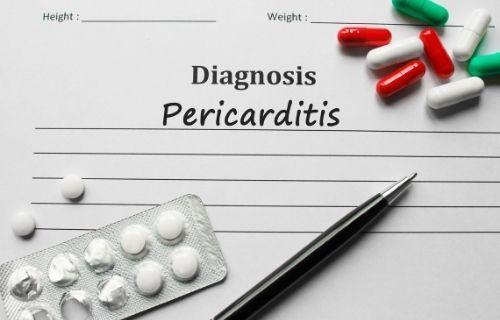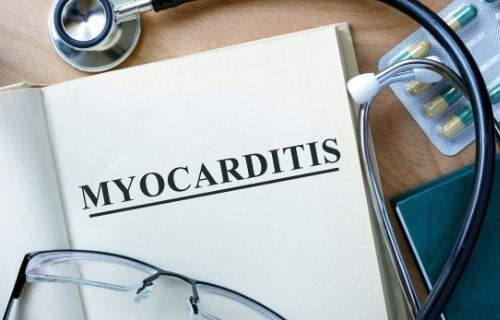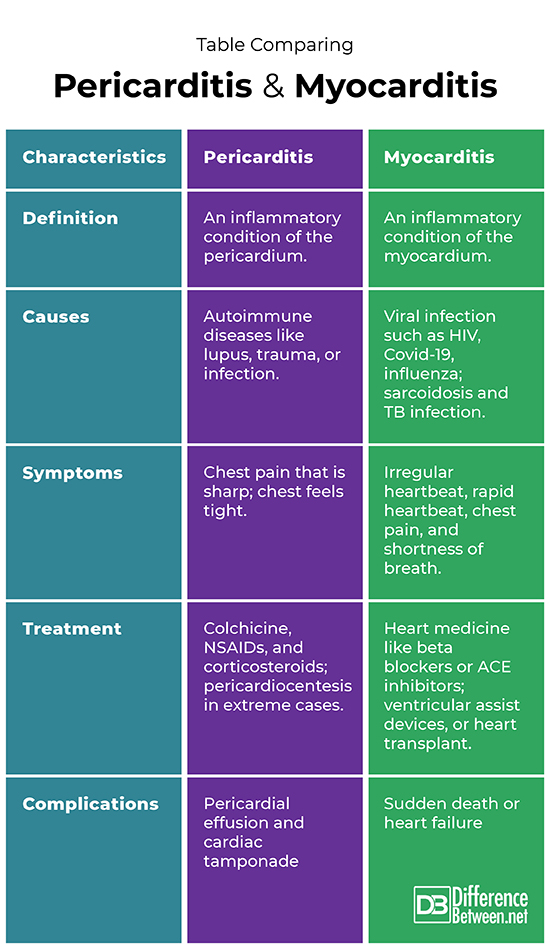Difference Between Pericarditis and Myocarditis
Pericarditis is when the pericardial membrane is inflamed. Myocarditis is when the heart muscle is inflamed.

What is Pericarditis?
Definition:
Pericarditis is the condition in which the pericardium (membrane surrounding the heart) becomes inflamed.
Causes and risk factors:
The cause of pericarditis is not always known but it can be from infection, a heart attack, or from traumatic injury. Lupus and other autoimmune illnesses like rheumatoid arthritis can lead to pericarditis. The condition can sometimes happen as a complication of cardiac surgery. Pericarditis is most common among males aged between 16 and 65 years.
Diagnosis:
A doctor can sometimes hear a specific sound called a pericardial rub, when using a stethoscope. Unusual readings on an ECG and visualization of the cardiac structures by means of an X-ray help with diagnosis. CT scans and MRI may be needed in some cases to diagnose constrictive pericarditis.
Symptoms and complications:
A tight feeling in the chest and pain in the chest. The pain in the chest is often described as sharp and behind the breastbone; it may extend to the arms. These symptoms often worsen as the person breathes deeply or when they are lying flat. Pericarditis often leads to an accumulation of fluid around the heart. When this builds up too much it can lead to cardiac tamponade, which can cause death if not treated.
Treatment:
The treatment depends on how severe the illness is. Often, nonsteroidal anti-inflammatories (NSAIDs) are given with corticosteroids and sometimes colchicine. A person may need to be in the hospital. If fluid accumulation (pericardial effusion) becomes a problem, then pericardiocentesis may need to be done to draw off this extra fluid.

What is Myocarditis?
Definition:
Myocarditis is the condition in which the muscle layer of the heart, the myocardium, becomes inflamed.
Causes and risk factors:
It is sometimes the case that the cause of myocarditis is not known. It can, however, be caused by viral infections such as Covid-19, coxsackie virus, and influenza. Myocarditis can also be caused by other illnesses, including sarcoidosis and TB. People with viral infections, including HIV, are at greater risk of myocarditis as are those who use drugs that are toxic.
Diagnosis:
Diagnosis is done by noting abnormal readings on an ECG and imaging tests like MRI. Certain cardiac markers (heart enzymes) are useful, but the most positive diagnosis is by endomyocardial biopsy in which a small piece of heart muscle is taken and examined.
Symptoms and complications:
Symptoms vary depending on how severe the problem is. One common symptom is an irregular or fast heartbeat. Shortness of breath and chest pain are other symptoms. The dangers of myocarditis are that it can lead to heart failure or sudden death. Complications from myocarditis are one of the main reasons people require a heart transplant.
Treatment:
Supportive therapy is used to treat myocarditis and may include medication such as beta blockers or angiotensin-converting enzyme (ACE) inhibitors. Sometimes ventricular assist devices or heart transplant may be needed.
Difference between Pericarditis and Myocarditis
Definition
Pericarditis is an inflammatory condition of the pericardium. Myocarditis is an inflammatory condition of the myocardium.
Causes
The causes of pericarditis include infection, trauma, or autoimmune disease. The causes of myocarditis include infection or sarcoidosis.
Symptoms
Pericarditis has symptoms such as chest pain and tightness. Myocarditis symptoms include irregular heartbeat and chest pain.
Treatment
Pericarditis treatment includes the use of NSAIDs, colchicine, and corticosteroids. Myocarditis treatment includes the use of heart medicine like beta-blockers, ventricular assist devices, or heart transplant.
Complications
Complications of pericarditis include pericardial effusion and cardiac tamponade. Complications of myocarditis include sudden death and heart failure.
Table comparing Pericarditis and Myocarditis

Summary of Pericarditis and Myocarditis
- Pericarditis and myocarditis are both heart conditions in which inflammation is involved.
- Infection can cause both myocarditis and pericarditis.
- Pericarditis is usually quite mild but can worsen.
- Myocarditis can be mild, but it tends to be more dangerous than pericarditis.
FAQ
Is pericarditis treatable?
Yes, pericarditis can be treated using certain medication and at times the problem resolves on its own.
Is pericarditis life-threatening?
Although not common, pericarditis that is not treated may cause life-threatening complications such as cardiac tamponade. It also can upset the heart rhythm which can be dangerous.
Can you have pericarditis and myocarditis?
Yes, it is possible for the inflammation of the heart muscle, myocardium, to extend into the membrane (pericardium). When this happens doctors call this myopericarditis.
How long can you live with pericarditis?
It depends on the type of pericarditis as to life expectancy. In the case of constrictive pericarditis of unknown cause, survival is over 80% for 7 years while if the condition is due to surgery, then it is only about 66%.
Which is worse myocarditis or pericarditis?
Myocarditis is a more serious condition while pericarditis is often a mild problem that goes away on its own.
Can you fully recover from myocarditis?
If the problem is not too serious then you can completely recover if you have myocarditis.
Does myocarditis permanently damage the heart?
It can lead to permanent damage if the myocarditis is severe enough as to put the person into heart failure.
How long does myocarditis take to heal?
It may take many months for a person to recover from myocarditis. This may depend on the cause and if this can be fixed.
Is myocarditis or pericarditis fatal?
Both conditions can be fatal if they are severe enough and there are cardiac complications.
- Difference Between Rumination and Regurgitation - June 13, 2024
- Difference Between Pyelectasis and Hydronephrosis - June 4, 2024
- Difference Between Cellulitis and Erysipelas - June 1, 2024
Search DifferenceBetween.net :
Leave a Response
References :
[0]Hoit, Brian D. “Myocarditis”. Merck Manual, 2021, https://www.msdmanuals.com/professional/cardiovascular-disorders/myocarditis-and-pericarditis/myocarditis
[1]Hoit, Brian D. “Pericarditis”. Merck Manual, 2021, https://www.msdmanuals.com/professional/cardiovascular-disorders/myocarditis-and-pericarditis/pericarditis
[2]Siripanthong, Bhurint, et al. "Recognizing COVID-19–related myocarditis: The possible pathophysiology and proposed guideline for diagnosis and management." Heart rhythm 17.9 (2020): 1463-1471.
